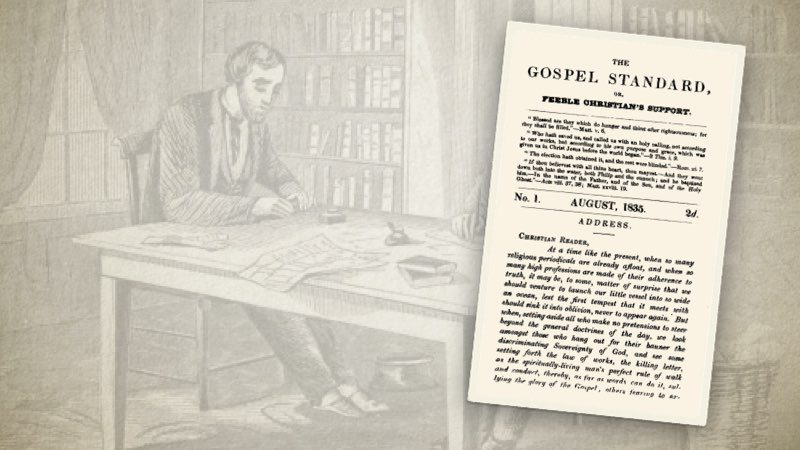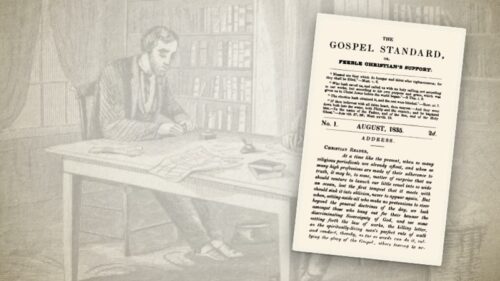
Ir-religious Associations
Gospel Standard 1838:
How good and pleasant it is for brethren to dwell together in unity and love, but how few there are that in truth, love, and godly fear we can walk and dwell with. Whatever men may say about the great prospects of religion in this day, for my own part I can see but little of them; for where a man is honest and bold enough to open his mouth wide for Christ’s true gospel, all the jackadandies, and ape-like parsons, whom the devil hath dressed up as angels of light, are about that poor soul, to slander, injure, and degrade him.
Indeed, my good and godly brethren, I mean no offence to any one in particular, but do speak the truth in Christ Jesus, and in the fear of God; where can you find even five or six ministers (who profess to be ministers of Christ) dwelling together in unity and love? No, are not all desiring to be masters? and should we call any man master? for one is our Master, even Christ. I have been reading the account, this evening, of that blessed servant of Christ, good Rowland Taylor, the martyr, who was burnt near Hadleigh, in Suffolk; and with some tears have I read the account, to see what boldness and holy resolution he stood with before the Papist. And why were a few like him singled out to suffer cruel mockings, and then the flames? “Why, because they were the clearest, boldest, and the firmest for Christ’s gospel in that age, and refused to call the pope and popish prelates masters, refused to have their souls fettered in the hellish chains of error.
And now, brethren, you see that amongst all this popish gang, these wolves of the devil, there were some who would be masters; and so it is now, not only amongst steeple-house people, but amongst all denominations of dissenters. For wherever you see what is called an association, immediately there must be some masters; poor, little, ignorant, puny creatures begin to puff, swell, and screw their jaws up, squeezing out a few stiff, pedantic words, to make them look like consequential master-parsons. One must be chairman, another moderator, secretaries, gentlemen of the committee, sub-committees, and I know not what, till really my soul has been sick to see the fuss, while the poor toads seemed swelling ready to burst with pride, wind, and puff. I have been at the S——k associations [does he allude to the Suffolk and Essex Baptist Association?—Eds], and E——x association, and there they made a mighty stir about their articles of faith, as if they must divide, and did divide. But behold! it came to pass it was not the purity of the faith made the bone of contention; but there were too many masters, and not sufficient honour for them all; so after there were two companies and two sets of masters, like Herod and Pilate, in the crucifixion of Christ, they soon united again, and both began to rail on the poor disciples of Jesus, who were decided for his truth and glory.
I will give you one instance of this unholy mastership. I was at one of those associations, and there was a poor minister, who, I believe, was a true servant of Christ, and for this, and this only, they intended separating him from the holy alliance, the association, only he happened to carry his resignation in his pocket, and 50 prevented it. Well, I assure you, I felt much for the poor man, for no popish congress that condemned the poor martyrs could ever stand over a poor creature with more masterly, devil-like, and bulldog-like authority than this set of men did, disdaining him for a vile Antinomian. And I felt truly vexed for the dear man, for he felt, timid in himself, though bold for the truth of his Lord.
But, however, the poor man was allowed (as a great favour) to dine with the assembly at the inn. So when dinner was over, the wine was handed round, and a vote of thanks to one, and a vote of thanks to another, for their services, and then all their hands or elbows rapping and roaring upon the table, similar to the noise in a play-house. Well, I observed this poor minister sat like a speckled bird and neither rapped the table nor drank to the toast. But when the noise was a little settled, he rose, took up his glass of wine, and said, “Gentlemen, I eat and drink, and desire to praise the Lord; but how can ye believe, who make this unhallowed noise, and receive honour one of another, and seek not the honour which comes from God?” Then he sat down, and a calm silence was observed a short time. At last, a fussy, dandy-like gentleman rose and made some apology, and some looked each other in the face solemnly, while others endeavoured to laugh it away. May the Lord deliver his servants from such worldly, sensual, and popish-like assemblies, and if they can find no better company, let them dwelt alone, and, like Enoch, walk with God by faith and prayer, and seek holy communion with the Father, Son, and Holy Ghost.
Here are now-a-days many parties, assemblies, societies, and associations; well, what must be done to make the chief and masters conspicuous? why, a large platform must be erected, like a show stage in a fair; then up comes the mountebank performers, one with a motion, another with a resolution; then they begin to shout and halloo, vieing with each other for praise, while the ignorant spectators stamp the floor and clap their hands they know not what for. And the key-note of all their orations is the praise of man, and the wonders he has done, and what he still means, to do for God; but the work, power, and glory of God in the soul must scarcely be mentioned on such occasions. Brethren, I believe that much of this mountebank work is to show off themselves, and to let the world see how popular they are growing in the religious world’s esteem.
A hypocrite signifies a stage-player, one who makes a false and deceitful show; and the devil sees that fire and faggot will not do now, so he gets the world (who must be religious now, in this wonderful day of evangelization) upon the stage of profession, and there they are dancing about like monkies and mountebanks, and mimicing the saints of the Most High, dressed up in the robes of profession, transforming themselves as angels of light.
A Fool For Christ’s Sake
Near Tillingham, Essex
It may be argued the Strict and Particular Baptist churches of the 17th, 18th and early 19th centuries were at their strongest when they remained independent congregations, unaffiliated with Magazines and Societies. This strength was lost during the latter half of the 19th century when the churches clamored around favorite periodicals and regional associations. Although the Magazines were largely responsible for creating a party-spirit and culpable for stirring up needless controversy, they nevertheless contain many valuable resources which may prove a blessing for this generation. Although they differed on various points of doctrine, they invariably held to high views of sovereign grace, denouncing as heresy the pernicious teachings of Andrew Fuller. The majority of Strict and Particular Baptist churches during the 18th and 19th centuries were Hyper-Calvinists.




